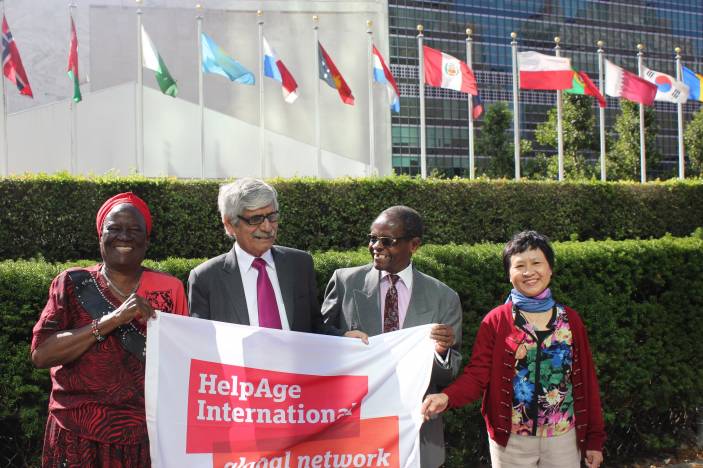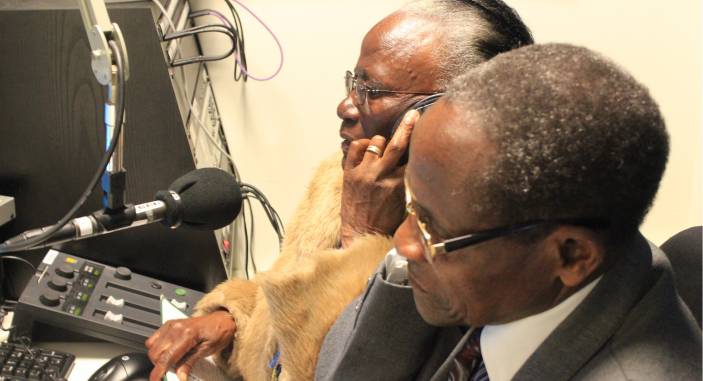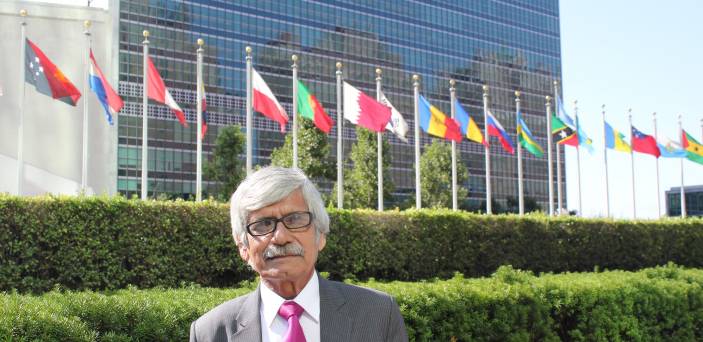The sixth session of the UN Open-ended Working Group on Ageing (OEWG) took place in New York last month, and four older activists from Zambia, Pakistan, Vietnam and Kenya attended to help get their issues heard. Mwiche from Zambia and Khalid from Pakistan share why they are interested in older people’s rights and discuss their own experiences of activism and discrimination in their countries.

“Older people must join together so that we have a louder voice”
My name is Mwiche. I’m 82 years old and from Zambia. The problem for elderly people in my country is a lack of education. Many of us are illiterate and are not included in the debates that impact our lives.
It’s crucial for older people to get their voices heard, and last month I was able to do this at the OEWG in New York. I was able to make a statement at the meeting and demand that older people are supported through a legally binding international convention.
HelpAge introduced me to idea of such a convention about a year ago, and when I heard that Zambia had only attended the meeting once, I decided to get involved to push for the government to send representatives. In spite of my campaigning, there were no Zambian delegates at the latest OEWG.
Campaigning isn’t easy and seeing that empty chair in New York was testament to that. But we must not be deterred as there’s a lot of work to done in fighting for ageing issues.
Firstly, we must help inform older people about their rights. By doing this, we can mobilise people and, with strength in numbers, we will be impossible to ignore. We can march on State House in Zambia and make demands. We must fight. Change will not come on a silver platter.

The assumption that families are always there to take care of older people is misplaced. Societal changes and the great distances that frequently split relatives in this day and age mean that older people cannot rely upon support from their family.
The help needs to come from elsewhere and the time has come for us to force the government to improve its policies towards older people. An effective convention would provide guidance to decision makers to ensure older people are not left behind.
We must educate people about their rights and we must think hard about how we can create change. Older people must join together so that we have a louder voice.
“We need to start to appreciate the wrinkles on our faces”
My name is Khalid and I’m a 68-year-old retired professor from Pakistan. Living here, it can be hell for older people. They face regular discrimination, and do not receive the services they should. We need an international instrument to protect the rights of older people in Pakistan to ensure we live comfortable lives.
There’s a saying in Urdu that goes ‘when you turn 60 you go mad, and when you turn 70 and 80, you become madder’. These are poisonous attitudes that create and reinforce society’s prejudice towards people as they grow older. We need to change, and this must happen both at the government and community level to support positive views about ageing.

Within families, elders aren’t being taken care like they used to – children are too busy to look after their older relatives, and it’s becoming an increasing problem as life expectancy increases and the number of older people grows.
When people get older, they feel they should withdraw from society. We need to instill a sense of belief among elders that they have plenty to offer in their later years.
Governments need to develop policies that support older people to carry on working if they are capable – they must not be forced to retire. We should also think about sexuality when people get older. It is not something that just disappears as individuals age.
An international instrument that forms the basis for a new discourse on ageing is vital. The government often thinks about the youth, and has only just started thinking about older people. If we succeed in having a new convention, this would help guide governments to ensure older people aren’t ignored.
Every person is born to grow old and we need to start to appreciate the wrinkles on our faces.
Find out more about our work in Pakistan and the outcomes of the OEWG.
